| Listing 1 - 10 of 11 | << page >> |
Sort by
|
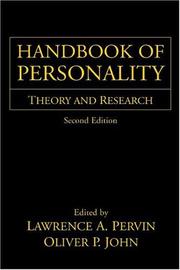
ISBN: 1572306955 9781572306950 Year: 1999 Publisher: New York (N.Y.): Guilford press,
Abstract | Keywords | Export | Availability | Bookmark
 Loading...
Loading...Choose an application
- Reference Manager
- EndNote
- RefWorks (Direct export to RefWorks)
Personality --- #KVHB:Persoonlijkheidspsychologie --- Personal identity --- Personality theory --- Personality traits --- Personology --- Traits, Personality --- Consciousness --- Mental health --- Psychology --- Soul --- Individuality --- Persons --- Self --- Temperament --- Personality psychology --- Personality. --- Personnalité
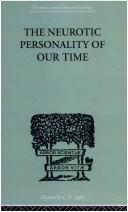
ISBN: 1315010534 1136341579 1136341641 9780415210966 0415210968 9781136341571 0415210968 0415211328 9780415211321 0415191327 9780415191326 9780415210942 0415210941 9781136341014 1136341013 0415210941 1299872247 1315010518 9781315010519 9781136341083 9781136341151 9781138875609 9781315010533 9781136341649 9781136341717 9781138875623 1136341080 Year: 1999 Publisher: London Routledge
Abstract | Keywords | Export | Availability | Bookmark
 Loading...
Loading...Choose an application
- Reference Manager
- EndNote
- RefWorks (Direct export to RefWorks)
First Published in 1999. Routledge is an imprint of Taylor & Francis, an informa company.
Neuroses. --- Personality. --- Psychoanalysis. --- Psychology --- Psychology, Pathological --- Personal identity --- Personality psychology --- Personality theory --- Personality traits --- Personology --- Traits, Personality --- Individuality --- Persons --- Self --- Temperament --- Neurosis --- Neurotic disorders --- Psychoneuroses --- Neuroticism --- Fathers --- Father and child --- Psychology.
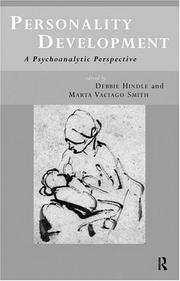
ISBN: 8183820859 1280329432 1134681704 0203130634 0203266072 9780203130636 9780415179577 0415179572 9780415179584 0415179580 9781134681709 9786610329434 6610329435 0415179572 0415179580 9781134681655 1134681658 9781134681693 1134681690 Year: 1999 Publisher: London New York Routledge
Abstract | Keywords | Export | Availability | Bookmark
 Loading...
Loading...Choose an application
- Reference Manager
- EndNote
- RefWorks (Direct export to RefWorks)
Personality Development is a comprehensive overview of infant observation and personality development. It starts at inter-utero life and goes through to adulthood, focusing on the emotional tasks involved at each stage of development and the interplay of internal processes and external circumstances. Contents include: * intra-uterine life and the experience of birth * babyhood: becoming a person in the family * the toddler and the wider world * the latency period. Using clinical and observational material, it will be of interest to those teaching personality de
Psychoanalysis. --- Developmental psychology. --- Personality. --- Personal identity --- Personality psychology --- Personality theory --- Personality traits --- Personology --- Traits, Personality --- Psychology --- Individuality --- Persons --- Self --- Temperament --- Development (Psychology) --- Developmental psychobiology --- Life cycle, Human --- Psychology, Pathological
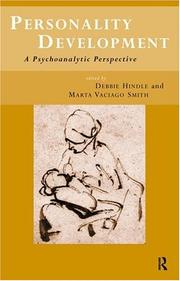
ISBN: 0415179580 Year: 1999 Publisher: New York London Routledge
Abstract | Keywords | Export | Availability | Bookmark
 Loading...
Loading...Choose an application
- Reference Manager
- EndNote
- RefWorks (Direct export to RefWorks)
Development (Psychology) --- Developmental psychology --- Développement [Psychologie du ] --- Identité personnelle --- Ontwikkelingspsychologie --- Personality --- Personality theory --- Personality traits --- Personnalité --- Personology --- Persoonlijkheid --- Psychanalyse --- Psychoanalyse --- Psychoanalysis --- Psychologie [Ontwikkelings] --- Psychologie du développement --- Traits [Personality ] --- Traits de caractère --- Traits de personnalité --- #PBIB:2001.2 --- Psychology --- Psychology, Pathological --- Personal identity --- Personality psychology --- Traits, Personality --- Individuality --- Persons --- Self --- Temperament --- Developmental psychobiology --- Life cycle, Human --- Personality.
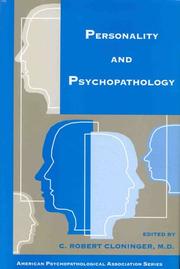
ISBN: 0880489235 Year: 1999 Publisher: Washington, DC : American psychiatric press,
Abstract | Keywords | Export | Availability | Bookmark
 Loading...
Loading...Choose an application
- Reference Manager
- EndNote
- RefWorks (Direct export to RefWorks)
#PBIB:2000.4 --- Mental illness --- Personality --- Personality disorders --- Psychology, Pathological --- Abnormal psychology --- Diseases, Mental --- Mental diseases --- Mental disorders --- Pathological psychology --- Psychology, Abnormal --- Psychopathology --- Neurology --- Brain --- Criminal psychology --- Mental health --- Psychiatry --- Psychoanalysis --- Disorders of personality --- Personality, Disorders of --- Personal identity --- Personality psychology --- Personality theory --- Personality traits --- Personology --- Traits, Personality --- Psychology --- Individuality --- Persons --- Self --- Temperament --- Etiology --- Complications --- Diseases --- Disorders --- Personality.

Abstract | Keywords | Export | Availability | Bookmark
 Loading...
Loading...Choose an application
- Reference Manager
- EndNote
- RefWorks (Direct export to RefWorks)
Sociology of culture --- Multiple personality. --- Personality. --- Persoonlijkheidspsychologie --- handboeken en inleidingen --- handboeken en inleidingen. --- Handboeken en inleidingen. --- Multiple personality --- Personality --- Personal identity --- Personality psychology --- Personality theory --- Personality traits --- Personology --- Traits, Personality --- Psychology --- Individuality --- Persons --- Self --- Temperament --- Alternating personality --- Consciousness, Multiple --- DID (Personality disorder) --- Dissociated personality --- Dissociative identity disorder --- Double consciousness --- Double personality --- Dual personality --- MPD (Personality disorder) --- Multiple consciousness --- Multiple identity disorder --- Multiple personalities --- Multiple personality disorder --- Personality, Multiple --- Split personality --- Dissociative disorders
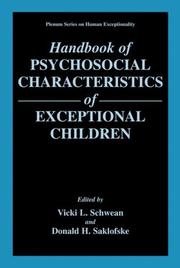
ISBN: 0306460637 1441933093 1475753756 Year: 1999 Volume: *1 Publisher: New York Dordrecht London Kluwer Academic/Plenum Publishers
Abstract | Keywords | Export | Availability | Bookmark
 Loading...
Loading...Choose an application
- Reference Manager
- EndNote
- RefWorks (Direct export to RefWorks)
Research has documented the reciprocal effects of exceptionality and secondary psychosocial and behavioral characteristics. This in-depth handbook examines the categories of exceptionality most often described in educational, behavioral, and health practices. Leading authorities from psychology, education, and medicine evaluate the key characteristics of particular exceptionalities from the vantage point of theory, research, assessment, and intervention.
#PBIB:2004.2 --- Exceptional children --- Atypical children --- Children --- Mental health --- Psychology --- Child psychology. --- School psychology. --- Clinical psychology. --- Personality. --- Social psychology. --- Cognitive psychology. --- Child and School Psychology. --- Clinical Psychology. --- Personality and Social Psychology. --- Cognitive Psychology. --- Psychology, Cognitive --- Cognitive science --- Mass psychology --- Psychology, Social --- Human ecology --- Social groups --- Sociology --- Psychiatry --- Psychology, Applied --- Psychological tests --- Personal identity --- Personality psychology --- Personality theory --- Personality traits --- Personology --- Traits, Personality --- Individuality --- Persons --- Self --- Temperament --- Psychology, School --- Behavior, Child --- Child behavior --- Child study --- Pediatric psychology --- Child development --- Developmental psychology --- Psychology.

ISBN: 1280207221 9786610207220 0306471698 0306461552 Year: 1999 Volume: *2 Publisher: New York Dordrecht London Kluwer Academic/Plenum Publishers
Abstract | Keywords | Export | Availability | Bookmark
 Loading...
Loading...Choose an application
- Reference Manager
- EndNote
- RefWorks (Direct export to RefWorks)
When we say that a person deserves a positive or negative outcome, we are making a judgment that is influenced by a number ofvariables. We would certainly take into account whether the person was resp- siblefortheoutcomeorwhethertheoutcomecouldbeattributedtoother sources. We would also consider whether the actions that led to the positive or negative outcome were actions that we would value or - tionsthatwouldmeetwithourdisapproval.Wemightalsobeinfluenced by the person’s own positive or negative characteristics, by ourkno- edgeofwhatkinds ofgroups orsocialcategoriesthepersonbelongedto, and by whether we like or dislike the person. Information about these differentvariableshastobe consideredandintegratedin someway, and our judgment of deservingness follows that psychological process, a process that involves the cognitive-affective system. Values, Achievements, and Justice is about deservingness and about the variables that affect the judgments we make. I use the term “dese- ingness” although I could equally have referred to “deservedness” or “desert.” The terms are all virtually equivalent in meaning, although dictionaries may separate them by using fine distinctions. I assume that the sorts of variables I have just described will affect ourjudgments of deservingness, and I further assume that a judgment of deservingness is most likely to occur when these variables fit together in a consistent, harmonious, and balanced way.
Deservingness. --- Judgment. --- Social justice -- Psychological aspects. --- Judgment --- Social justice --- Psychology --- Social Sciences --- Psychological aspects --- Psychological aspects. --- Deservingness --- Judgement --- Jugement --- Oordeel --- #PBIB:2001.2 --- Psychology. --- Personality. --- Social psychology. --- Cognitive psychology. --- Personality and Social Psychology. --- Cognitive Psychology. --- Criminology and Criminal Justice, general. --- Consciousness. --- Criminology. --- Equality --- Justice --- Knowledge, Theory of --- Language and languages --- Thought and thinking --- Wisdom --- Crime --- Social sciences --- Criminals --- Psychology, Cognitive --- Cognitive science --- Mass psychology --- Psychology, Social --- Human ecology --- Social groups --- Sociology --- Personal identity --- Personality psychology --- Personality theory --- Personality traits --- Personology --- Traits, Personality --- Individuality --- Persons --- Self --- Temperament --- Study and teaching
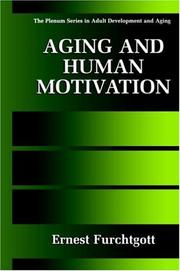
ISBN: 0306460742 1441933115 1475744633 Year: 1999 Publisher: New York Kluwer Academic
Abstract | Keywords | Export | Availability | Bookmark
 Loading...
Loading...Choose an application
- Reference Manager
- EndNote
- RefWorks (Direct export to RefWorks)
I first met Ernest Furchtgott twenty-five years ago after joining the faculty of the College of Social Work at the University of South Carolina. At that time, Ernie chaired the Department of Psychology. In the following three years we collaborated with an Academic Committee on Gerontology in conceptualizing and shaping the University's Certificate of Graduate Study in Gerontology Program, guiding it to final approval by the South Carolina Commission on Higher Education. For twenty years we team taught our graduate-level course, "Psychosocial Approaches to Geron tology," involving colleagues from related disciplines. Over the years, we examined and jointly graded hundreds of research posters prepared by our graduate students in gerontology as their final course requirement. Several years ago, Ernie formally retired from the university. He in stantly agreed to my request that he continue teaching the psychology of aging portion of our interdisciplinary course. On campus nearly every day since retirement, Ernie frequently telephoned to discuss are cent article in The Gerontologist or a paper presentation that had ex cited him at the Gerontological Society's annual scientific meeting. He maintained a clear presence in the academic community.
#PBIB:2001.2 --- Motivation (Psychology) in old age. --- Older people --- Ontwikkelingspsychologie --- Psychology. --- volwassenen en derde leeftijd --- volwassenen en derde leeftijd. --- Motivation (Psychology) in old age --- Geropsychology --- Psychology --- Personality. --- Social psychology. --- Cognitive psychology. --- Clinical psychology. --- Psychology, general. --- Personality and Social Psychology. --- Cognitive Psychology. --- Clinical Psychology. --- Mass psychology --- Psychology, Social --- Human ecology --- Social groups --- Sociology --- Personal identity --- Personality psychology --- Personality theory --- Personality traits --- Personology --- Traits, Personality --- Individuality --- Persons --- Self --- Temperament --- Behavioral sciences --- Mental philosophy --- Mind --- Science, Mental --- Human biology --- Philosophy --- Soul --- Mental health --- Psychiatry --- Psychology, Applied --- Psychological tests --- Psychology, Cognitive --- Cognitive science --- Motivation (Psychology) --- Action, Psychology of --- Drive (Psychology) --- Psychology of action
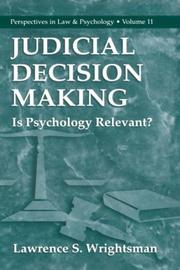
ISBN: 0306461544 1461371783 1461548071 9780306461545 Year: 1999 Volume: 11 Publisher: New York: Kluwer academic/Plenum,
Abstract | Keywords | Export | Availability | Bookmark
 Loading...
Loading...Choose an application
- Reference Manager
- EndNote
- RefWorks (Direct export to RefWorks)
In the mid-1970s, as a social psychologist dedicated to the application of knowl edge, I welcomed our field's emerging interest in the legal system. I have al ways been fascinated by jury trials-something about the idea that two con ceptions of the truth were in irrevocable conflict and jurors could choose only one of them. More important, the criminal justice system is a major social force that has been ignored by social psychologists for most of the twentieth century. As I systematically began to explore the applications of social psycho logical concepts to the law 20 years ago, I experienced the delight of discovery similar to that of a child under a Christmas tree. It has been satisfying to be among the cohort of researchers who have studied the legal system, especially trial juries, from a psychological perspective. I believe we have learned much that would be useful if the system were to be revised. Hlf the system were to be revised" . . . there's the rub. As I have stated, my original motivation was the application of knowledge. Like other social scien tists, I believed-perhaps arrogantly-that the results of our research efforts could be used to make trial juries operate with more efficiency, accuracy, and satisfaction. Qver the last two decades, much knowledge has accumulated. How can we put this knowledge to work? Judges are the gatekeepers of the legal system.
Judges --- Judicial process --- Law --- Psychological aspects. --- Thinking --- Behavioral Sciences --- Social Control, Formal --- Health Care Economics and Organizations --- Behavioral Disciplines and Activities --- Mental Processes --- Sociology --- Social Sciences --- Psychiatry and Psychology --- Psychological Phenomena and Processes --- Health Care --- Anthropology, Education, Sociology and Social Phenomena --- Decision Making --- Jurisprudence --- Psychology --- Law - U.S. --- Law, Politics & Government --- Law - U.S. - General --- Psychological aspects --- United States --- Psychology. --- Personality. --- Social psychology. --- Clinical psychology. --- Criminology. --- Law and Psychology. --- Personality and Social Psychology. --- Clinical Psychology. --- Criminology and Criminal Justice, general. --- Crime --- Social sciences --- Criminals --- Psychiatry --- Psychology, Applied --- Psychological tests --- Mass psychology --- Psychology, Social --- Human ecology --- Social groups --- Personal identity --- Personality psychology --- Personality theory --- Personality traits --- Personology --- Traits, Personality --- Individuality --- Persons --- Self --- Temperament --- Behavioral sciences --- Mental philosophy --- Mind --- Science, Mental --- Human biology --- Philosophy --- Soul --- Mental health --- Study and teaching --- Judges - United States. --- Judicial process - United States. --- Law - Psychological aspects. --- PSYCHOLOGIE JUDICIAIRE --- DECISION JUDICIAIRE --- MARIAGE HOMOSEXUEL --- COUR SUPREME --- EXPERTISE --- ELABORATION
| Listing 1 - 10 of 11 | << page >> |
Sort by
|

 Search
Search Feedback
Feedback About UniCat
About UniCat  Help
Help News
News